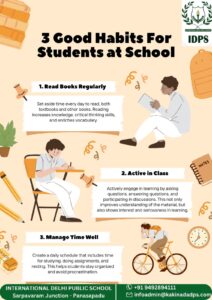What is the Reading Culture at DPS Kakinada?
The reading culture at DPS Kakinada is a well-integrated part of daily life. It involves:
- Structured reading programs during school hours
- Classroom libraries and central library access
- Reading challenges and book reviews
- Participation in literary events and competitions
- Book fairs and author interactions
- Integration of reading across subjects
From early readers in primary grades to advanced texts for senior students, the school tailors reading experiences according to age and interest levels.
Why is Reading Important at DPS Kakinada
The school believes reading is the foundation for academic excellence and personal development. Here’s why:
- Improves Language Skills: Regular reading enhances vocabulary, grammar, and comprehension.
- Boosts Academic Performance: Readers perform better in subjects like English, Social Science, and even STEM.
- Fosters Creativity and Imagination: Stories stimulate visual thinking and creative expression.
- Encourages Independent Learning: Reading develops self-discipline and intellectual curiosity.
- Builds Emotional Intelligence: Literature introduces students to diverse perspectives, fostering empathy.
How is the Reading Culture Promoted
- Dedicated Library Periods: Every class has assigned library sessions to read, explore, and check out books.
- Reading Corners in Classrooms: Each classroom, especially in junior grades, features a cozy reading corner with age-appropriate books.
- Literary Clubs and Reading Circles: Book clubs, group readings, and student-led discussions allow for collaborative literary exploration.
- Morning Reading Time: Weekly silent reading slots during morning routines help start the day calmly and meaningfully.
- Book Fairs and Events: The school hosts regular book fairs, storytelling sessions, and literary weeks to make reading fun and festive.
- Author Visits and Storytelling Sessions: Interactions with authors and storytellers make the reading experience come alive.
Key Features of the Reading Program
- Age-Specific Book Selection: Books are carefully chosen to suit the developmental needs of each grade.
- Multilingual Reading: The school promotes reading in English, Hindi, and Telugu, encouraging multilingual fluency.
- Digital and Print Integration: Alongside traditional books, students are introduced to eBooks and audiobooks for modern reading exposure.
- Student-Led Reviews: Students are encouraged to write or present reviews, which are often displayed on bulletin boards or the school website.
- Reading for a Cause: Events like Read-a-thons are sometimes linked with charitable goals to build social responsibility.
Process of Implementing the Reading Program
- Planning the Reading Calendar: Each academic year begins with a reading plan that includes book themes, literary events, and reading goals.
- Classroom Integration: Teachers design activities around books—discussions, vocabulary work, dramatization—to deepen engagement.
- Library Management: A librarian helps students discover new genres, track reading progress, and recommend books based on interests.
- Student Involvement: Students participate in curating reading lists, organizing library events, and conducting peer storytelling.
- Monitoring Progress: Through reading logs, oral summaries, and quizzes, teachers track individual progress and encourage reflection.
Benefits of the Reading Culture at DPS Kakinada
- Enhanced Academic Achievement: Students who read regularly show improvement across all academic areas.
- Better Communication Skills: Reading boosts vocabulary, clarity of thought, and effective expression in both spoken and written forms.
- Confidence Building: As students understand and engage with complex ideas, they become more confident speakers and writers.
- Emotional and Social Growth: Characters and stories help students explore feelings, relationships, and social situations with more empathy.
- Digital Discipline: Encouraging reading offers a healthy balance to screen time and promotes focus and patience.
- Life-Long Learning: A strong reading habit stays with students for life, helping them grow as informed, reflective individuals.
Conclusion
The impact of reading at Delhi Public School Kakinada is visible in its articulate students, thoughtful discussions, and rich school culture. By making reading a daily habit and a joyful pursuit, the school prepares children not just for exams—but for life. The stories they read shape the stories they’ll write in the world.
Reading at DPS Kakinada is not just encouraged—it’s celebrated. It’s an invitation to explore new worlds, develop sharp minds, and nurture kind hearts—one book at a time.
Frequently Asked Questions
DPS Kakinada encourages reading through library periods, reading challenges, book fairs, and access to a wide range of print and digital resources.
Students have access to storybooks, subject-specific texts, magazines, newspapers, and e-books, catering to all grade levels and interests.
Reading enhances vocabulary, comprehension, imagination, and critical thinking, while also improving academic performance across subjects.
Yes, DPS Kakinada conducts silent reading hours, storytelling sessions, author talks, and book review activities to make reading interactive and engaging.
Absolutely. Teachers guide book selection and discussion, while parents are encouraged to support reading at home as part of the school’s holistic learning approach.
The impact is tracked through improved language skills, reading logs, participation in book-based events, and feedback from teachers during assessments.








